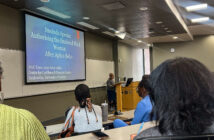Headlines, warnings from the United States Surgeon General, anecdotes and studies all suggest that the U.S. is experiencing an epidemic of loneliness. In an age when the internet has the ability to connect people more than ever, why do more than 50% of Americans report feeling lonely?
According to researchers with Harvard Graduate School of Education’s Making Common Care project, the leading cause is actually technology itself.
There was an inevitable surge of loneliness when the COVID pandemic isolated us within our homes and 60% of Americans reported losing touch with at least one friend. But even before the world shut down, one in two people reported feeling loneliness in 2019, according to a U.S. Surgeon General’s Advisory.
This is more than just a statistical anomaly. It’s a public health crisis, as loneliness and social isolation increase the risk of premature death by 26% and 29% respectively.
It’s not that people want to be alone. Rather, the lack of boundaries in the digital age is making us all worse, more emotionally-distant friends.
A study conducted by Healthline suggests people spending more time interacting digitally detracts from the energy available for in-person interactions. On average, people spend two hours a day engaging with others online and six hours and 38 minutes online overall — a number we can expect to increase.
Today, everyone is constantly available to their entire social network, making us feel as though we’re responding to a constant stream of texts and emails. This 24/7 availability extends to the workplace, blurring the line between work and home life.
What might have once been responding to a couple phone calls a day is now a constant bombardment that can feel never ending.
This ultimately leads to digital burnout, which is characterized by fatigue, stress and a reduced desire to engage. Everyone needs downtime to recharge after a long day of work or social interactions, even when those we’re interacting with are our friends. But now, even in our downtime, we’re plagued by the guilt of not responding to every single text and email.
This digital burnout makes it more difficult for people to feel recharged and ready to hang out with friends in person.
On top of digital burnout, the U.S. is seeing a rise of hyper-individualistic culture that discourages reliance on others.
For example, in a post on X, user @Codie_Sanchez said, “As an adult, don’t ask your friends to pick you up from the airport. Use uber, save a friendship.”
Similarly, @Cathrynlavery said in a post, “As an adult, don’t ask your friends to help you move. Hire movers, save a friendship.”
In both of these posts, the user implies it’s “immature” to rely on your friends for help. What could have been a moment of bonding and community-building then turns into a cold exchange of services.
Similarly, apps like Instacart, Grubhub and Doordash further create a world where we lose the small interactions like, with a cashier who tells you she likes your skirt or a barista who remembers your coffee order.
As our groceries or takeout meals are left to be swooped up on our doorsteps after our delivery drivers have already pulled away, the separation between us grows.
However, the inability to pick up one’s own groceries, to take a friend to the airport or to become a regular at a local coffee shop often has less to do with a lack of desire to do these things. Instead, it’s because it feels like there’s just not enough time in the day.
Even though Americans are working less than ever, the way we think about free time has changed dramatically in recent years.
According to the BBC, culturally, people associate “having no time” with success. This is why people fill what should be their “off” time with productive or marketable activities and 54% of Americans don’t use their vacation days.
The impersonalization of social interactions inspired by the stress of having no leisure time, seeps into the way people interact with their friends digitally. This can be seen in the unsympathetic template offered by one X user for rejecting someone’s request for emotional support, which sparked debate about why people are less emotionally available to their friends.
The impersonal interaction can also be seen in the constant complaining online about “trauma dumping” — a non-psychological term that criticizes the oversharing of problems.
Even as a culture of overworked, overly online, lonely people, there has to be a way to start building stronger connections with those around us and avoid becoming bad friends.
Being intentional about the social interactions you have — even by simply planning a time to Facetime your best friend instead of dragging the same conversation out for three weeks over text, for example — saves your energy for the moments that really matter.






Comment policy
Comments posted to The Brown and White website are reviewed by a moderator before being approved. Incendiary speech or harassing language, including comments targeted at individuals, may be deemed unacceptable and not published. Spam and other soliciting will also be declined.
The Brown and White also reserves the right to not publish entirely anonymous comments.